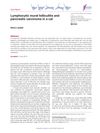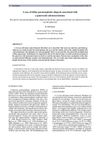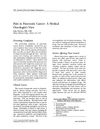 15 citations,
November 2023 in “Immunity & ageing”
15 citations,
November 2023 in “Immunity & ageing” TLR4 is important in aging-related diseases and could be a new treatment target.
12 citations,
March 2023 in “Frontiers in immunology” Atopic dermatitis increases the risk of some autoimmune diseases.
8 citations,
July 2015 in “Molecular cytogenetics” A complex X chromosome rearrangement can increase the risk of multiple autoimmune diseases.
 2 citations,
February 2023 in “BMC women's health”
2 citations,
February 2023 in “BMC women's health” Birth control pills change the activity of certain inflammation and blood clotting genes in women with PCOS.
 May 2023 in “Frontiers in Immunology”
May 2023 in “Frontiers in Immunology” Treg cell-based therapies might help treat hair loss from alopecia areata, but more research is needed to confirm safety and effectiveness.

Testosterone in human pancreas cells boosts insulin production.

Testosterone in our bodies helps increase insulin secretion from the pancreas.
March 2020 in “The Thai Journal of Veterinary Medicine” A Thai Bangkaew dog with diabetes and pancreatic issues improved with insulin, enzymes, and vitamins.
15 citations,
November 2020 in “Physiological reports” Sox6 is important in heart and kidney health, affecting diseases like diabetes, heart disease, and high blood pressure.
 64 citations,
September 2006 in “International journal of epidemiology”
64 citations,
September 2006 in “International journal of epidemiology” Cancer development is like natural selection, involving mutated cells and environmental factors.
 49 citations,
May 2020 in “Frontiers in Public Health”
49 citations,
May 2020 in “Frontiers in Public Health” Insulin resistance linked to obesity may increase COVID-19 severity.
 21 citations,
May 2021 in “Prostate Cancer and Prostatic Diseases”
21 citations,
May 2021 in “Prostate Cancer and Prostatic Diseases” COVID-19 might worsen symptoms and progression of benign prostatic hyperplasia, possibly due to inflammation and metabolic disturbances in the prostate gland. More research is needed to confirm this.
 3 citations,
January 2017 in “Revista chilena de nutrición”
3 citations,
January 2017 in “Revista chilena de nutrición” Certain natural compounds called terpenes may help prevent prostate cancer.
 2 citations,
March 2019 in “Veterinary dermatology”
2 citations,
March 2019 in “Veterinary dermatology” Thymoma in cats can cause hair loss without inflammation.
 1 citations,
January 2015 in “Journal of nutrition & health”
1 citations,
January 2015 in “Journal of nutrition & health” Fish oil improves skin health in people with diabetes and high cholesterol.

 10 citations,
August 2023 in “Advanced Science”
10 citations,
August 2023 in “Advanced Science” Nitric Oxide has potential in medicine, especially for infections and heart treatments, but its short life and delivery challenges limit its use.
1 citations,
March 2024 in “Nanomaterials” Biomimetic scaffolds are better than traditional methods for growing cells and could help regenerate various tissues.
 1 citations,
January 2013 in “Journal of Cosmetics, Dermatological Sciences and Applications”
1 citations,
January 2013 in “Journal of Cosmetics, Dermatological Sciences and Applications” The document concludes that a new treatment for a type of hair loss called telogen effluvium was tested and shows promise.
 September 2023 in “Physiology and Pharmacology”
September 2023 in “Physiology and Pharmacology” Glucocorticoids can cause various health issues, but some treatments may help reduce these effects.
 6 citations,
May 2009 in “Cell transplantation”
6 citations,
May 2009 in “Cell transplantation” Green tea component EGCG helps keep rat skin grafts viable longer.
 282 citations,
April 2007 in “Journal of Agricultural and Food Chemistry”
282 citations,
April 2007 in “Journal of Agricultural and Food Chemistry” Apple polyphenol, especially oligomeric procyanidins, can reduce fat absorption and lower blood fat levels.
 59 citations,
August 2021 in “Frontiers in Endocrinology”
59 citations,
August 2021 in “Frontiers in Endocrinology” GLP-1 receptor agonists, like Dulaglutide, Liraglutide, and Semaglutide, have potential benefits beyond the pancreas, including neuroprotection, pain suppression, cardiovascular protection, obesity management, and cancer treatment, but there are concerns about pancreatitis and pancreatic cancer risks.
 52 citations,
January 1999 in “Journal of Small Animal Practice”
52 citations,
January 1999 in “Journal of Small Animal Practice” Removing a cat's pancreatic cancer can temporarily reverse hair loss caused by the disease.
 9 citations,
November 2014 in “Journal of feline medicine and surgery”
9 citations,
November 2014 in “Journal of feline medicine and surgery” Lymphocytic mural folliculitis in cats might be an early sign of pancreatic cancer.
 July 2023 in “Journal of the Mexican chemical society”
July 2023 in “Journal of the Mexican chemical society” Hibiscus rosa-sinensis leaf extract might help reduce fat absorption and could be used to treat obesity.
 February 2008 in “Vlaams dierengeneeskundig tijdschrift”
February 2008 in “Vlaams dierengeneeskundig tijdschrift” A cat's hair loss was linked to a severe pancreatic cancer.
 January 1988 in “Journal of Pain and Symptom Management”
January 1988 in “Journal of Pain and Symptom Management” Pancreatic cancer pain management is inadequate due to the disease's severity and limited effectiveness of treatments.
 4 citations,
October 2021 in “Canadian Journal of Physiology and Pharmacology”
4 citations,
October 2021 in “Canadian Journal of Physiology and Pharmacology” Women with pancreatic cancer are more likely to have certain side effects from chemotherapy than men.
 June 2018 in “Surgical Case Reports”
June 2018 in “Surgical Case Reports” S-1 treatment led to a complete response in pancreatic cancer with manageable side effects.

























